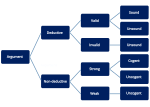
Back تفكير منطقي Arabic Schlussfolgerung German استدلال منطقی Persian Liste de concepts logiques French 論理的推論 Japanese Пайымдау Kazakh Redenering Dutch منطقی استدلال PNB Raciocínio lógico Portuguese Логическое рассуждение Russian
| ||||||||||||||||||||||||||||||||||||||||||||||||
| Logical reasoning is concerned with the correctness of arguments. A key distinction is between deductive and non-deductive arguments. |
Logical reasoning is a mental activity that aims to arrive at a conclusion in a rigorous way. It happens in the form of inferences or arguments by starting from a set of premises and reasoning to a conclusion supported by these premises. The premises and the conclusion are propositions, i.e. true or false claims about what is the case. Together, they form an argument. Logical reasoning is norm-governed in the sense that it aims to formulate correct arguments that any rational person would find convincing. The main discipline studying logical reasoning is logic.
Distinct types of logical reasoning differ from each other concerning the norms they employ and the certainty of the conclusion they arrive at. Deductive reasoning offers the strongest support: the premises ensure the conclusion, meaning that it is impossible for the conclusion to be false if all the premises are true. Such an argument is called a valid argument, for example: all men are mortal; Socrates is a man; therefore, Socrates is mortal. For valid arguments, it is not important whether the premises are actually true but only that, if they were true, the conclusion could not be false. Valid arguments follow a rule of inference, such as modus ponens or modus tollens. Deductive reasoning plays a central role in formal logic and mathematics.
For non-deductive logical reasoning, the premises make their conclusion rationally convincing without ensuring its truth. This is often understood in terms of probability: the premises make it more likely that the conclusion is true and strong inferences make it very likely. Some uncertainty remains because the conclusion introduces new information not already found in the premises. Non-deductive reasoning plays a central role in everyday life and in most sciences. Often-discussed types are inductive, abductive, and analogical reasoning. Inductive reasoning is a form of generalization that infers a universal law from a pattern found in many individual cases. It can be used to conclude that "all ravens are black" based on many individual observations of black ravens. Abductive reasoning, also known as "inference to the best explanation", starts from an observation and reasons to the fact explaining this observation. An example is a doctor who examines the symptoms of their patient to make a diagnosis of the underlying cause. Analogical reasoning compares two similar systems. It observes that one of them has a feature and concludes that the other one also has this feature.
Arguments that fall short of the standards of logical reasoning are called fallacies. For formal fallacies, like affirming the consequent, the error lies in the logical form of the argument. For informal fallacies, like false dilemmas, the source of the faulty reasoning is usually found in the content or the context of the argument. Some theorists understand logical reasoning in a wide sense that is roughly equivalent to critical thinking. In this regard, it encompasses cognitive skills besides the ability to draw conclusions from premises. Examples are skills to generate and evaluate reasons and to assess the reliability of information. Further factors are to seek new information, to avoid inconsistencies, and to consider the advantages and disadvantages of different courses of action before making a decision.
© MMXXIII Rich X Search. We shall prevail. All rights reserved. Rich X Search
